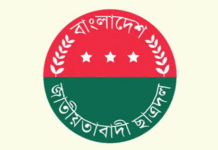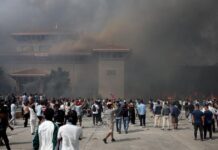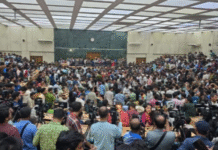Bangladeshi migrant workers detained, tortured and extorted in camps in lawless Libya; families back home go in debt to pay traffickers

“Please don’t reveal my son’s name in the news, he is still in Libya, he will get killed by his trafficker,” she implored, talking over the phone from Noakhali.
The fear is real. In August, her 21-year-old son Aiman (not his real name) was released after two months of hell in a camp in Brak al-Shati, an outpost in the middle of the Sahara desert, 700km from Libya’s capital Tripoli.

Aiman was among a group of 27 Bangladeshis locked up in a camp run by human traffickers between June and the beginning of this month.
Traffickers in Libya usually intercept those trying to reach Europe by boat via irregular migration channels, hold them hostage, and torture them for ransom.
On May 27 this year, a horrifying massacre took place in such a camp in another town called Mizdah, where 26 Bangladeshis were killed when a fight broke out between the traffickers and hostages.
Aiman, for example, was imprisoned in Brak al-Shati in June, the month after the massacre at Mizdah.
“As our group was released from the centre one-by-one, a new group including 28 Bangladeshis were brought into the same camp in early September,” said Aiman, speaking to The Daily Star from Tripoli.
But just how many Bangladeshis are being imprisoned, and where, is something that the Bangladesh mission in Tripoli cannot track, largely owing to the conflict-ridden landscape of the country — currently ruled by at least two “governments” and also fragmented into territories ruled by militias.
“There are many such camps all over Libya run by the militias where Bangladeshis are often held,” said ASM Ashraful Islam, labour counsellor of the Bangladesh High Commission in Tripoli.
“They are usually imprisoned by traffickers when they try to go to Europe.”
Aiman went to Libya two years ago.
“I studied in a madrasa in Noakhali and had no job after finishing school, so I migrated to Libya to work as a pipe fixer. But there was little work that year,” he said.
When the pandemic arrived on top of the ongoing civil war in the country — struggling to make ends meet, he decided to go to Italy.
“I could go back to Bangladesh, but I would have no money and no future. I had to tough it out,” said Aiman.
He managed to pay a Bangladeshi human trafficker named Md Mokhlesur Rahman in Libya to go to Italy. This correspondent attempted to reach that man but he did not respond to repeated calls.
“We set off from a coastal town called Zawia, 50km from Tripoli. We had made it out to sea when we were intercepted by a mafia. They brought us back to land and detained us for several days,” said Aiman.
“We called the trafficker [Mokhles] and he said he is sending two drivers to fetch us. The drivers, instead of taking us somewhere safe, drove us out to the desert.”
“Once in the desert, we could not get out of the car, because we would die of thirst in the Sahara.”
To this day, he is not sure who sold them to the camp — the drivers or the human trafficker.
They were blindfolded at one point before entering Brak al-Shati, so Aiman does not know exactly where the camp is. “But there was a gas or oil factory beside it,” he said.
He also does not know when he arrived there — he lost count of the dates during his period of detention.
“There were two Bangladeshi translators in the camp, named Hridoy and Islam, but I doubt those are their real names. They translated the demands of the mafia to us,” said Aiman.
They demanded Tk 10 lakh from each of the migrants. They tortured the men — but Aiman, understandably, was reluctant to recall the details.
“They tortured us the way people are usually tortured. They video-called our family members and tortured us on the call. In addition, they starved us. We only got a piece of bread every morning,” he said.
Several videos leaked to law enforcement agencies from the “campos” — like the one Aiman was held in — show that brutal forms of torture are inflicted on the hostages.
The videos show Bangladeshi migrants laid out on the ground with their legs held up between a wooden clamp. Their captors repeatedly whipped the soles of their feet, leaving criss-crossing welts across the skin, making the men writhe in pain.
“Abba send money, Abba they will kill me!” one man implored, crying in pain. “Please no more, I can’t take it!” another said.
Aiman’s mother learnt about her son’s captivity one month and 18 days after he went off the radar.
“My son has a distant uncle in Tripoli, and the traffickers contacted him. He contacted us and told us to send over Tk 10 lakh. He gave us different phone numbers for sending mobile money, and a bank account number too,” she said.
The money was handed over to the traffickers by Aiman’s uncle on August 3. Aiman was released on August 8.
“I was the first to get released,” he said.
His friend Osama (not his real name) followed soon after.
Osama’s father, speaking to The Daily Star from Lakshmipur, said he had to send over around Tk 12-13 lakh.
“My son called me and told me that he is being tortured by the mafia. I am a small businessman but I took loans, managed the money, and transferred it to a Bangladeshi bank account given to me after Eid-ul-Azha,” he said.
“They tortured my son so much, he needed to be hospitalised there. I paid his medical bills,” he added.
Aiman added, “Osama and I went to the Bangladesh Embassy to report the incident. We told them details of everything that happened. We told them that there were many Bangladeshis being held captive, but they did not help.
“A second group of 28 Bangladeshis were brought to the camp in September … my friend who was released a few days back, told me of this.”
Labour Counsellor Ashraful confirmed that they received reports of a group of Bangladeshis being caught by the mafia in mid-June and transported to Brak al-Shati.
“But we don’t know how many there are in the camp right now, or who they are, because the ones who got out, do not keep in touch with us,” he said.
“It is also not possible for us to just go to these militia-held areas in the middle of the Sahara desert to rescue Bangladeshis, because we do not have the support needed for that.”
Tripoli, where the Bangladesh Embassy is based, is governed by the internationally recognised Government of National Accord (GNA), while Brak al-Shati is in an area governed by the opposing Libyan National Army (LNA), led by military commander Khalifa Haftar.
It is a dangerous area — the top news reference of Brak al-Shati is that of a 2017 clash between LNA and a paramilitary group called Benghazi Defence Brigades there, leaving 141 people killed.
Ashraful said he alerted law enforcement agencies in Bangladesh about the migrants in Brak al-Shati.
However, the relevant ministries seem unaware of this news concerning the migrants.
Director-General (Africa Wing) at the Ministry of Foreign Affairs Maleka Parveen said she did not receive any communication about this from the embassy in Tripoli. “I can ask them and let you know,” she said.
Bashir Ahmed, additional secretary (Employment Wing) of the Ministry of Expatriates’ Welfare and Overseas Employment, said, “We have not got any complaints regarding this.”
Syeda Zannat Ara, special superintendent of police (serious crimes and homicide) of the Criminal Investigation Department (CID), who is investigating the Mizdah massacre, was not also made aware of Aiman’s group in Brak al-Shati.
“There are many such camps in Libya we heard,” she said.
CID is currently cracking down on Bangladeshi human traffickers based in Libya who were responsible for the massacre in Mizdah.
Nine survivors of the massacre were brought back to Dhaka last month and the CID has recorded their statements.
A total of 26 cases have been filed in this regard — 15 of which were filed by CID. A total of 44 people have been arrested in these cases.
But the phenomenon of detaining migrants for ransom is so vast, and so deep-rooted in the migration scenario of Libya, that these efforts by law enforcement agencies are only beginning to scratch the surface.
“The embassy cannot protect us, so we stopped picking up their calls. I need to stay here to work and send Tk 10 lakh back home,” said Aiman, who now works as an undocumented migrant at a sweetmeat factory for a fraction of his previous salary.
His mother concurred with him.
“All the money I sent, I had to loan. If my son sends even Tk 10, it will be more than what I have now,” she said.
On September 24, Amnesty International published an investigation report titled “Between life and death: Refugees and migrants trapped in Libya’s cycle of abuse” documenting detention and torture in Libya.
“Tens of thousands of refugees and migrants in Libya are trapped in a vicious cycle of cruelty with little to no hope of finding safe and legal pathways out. After enduring unconscionable suffering in Libya, refugees and migrants risk their lives at sea seeking safety in Europe, only to be intercepted, transferred back to Libya and delivered to the same abuses they sought to escape,” the report said.
“Refugees and migrants intercepted at sea by the Libyan Coast Guard are brought back to Libya, where they are subjected to enforced disappearances, indefinite and arbitrary detention, torture and extortion,” it also stated.









